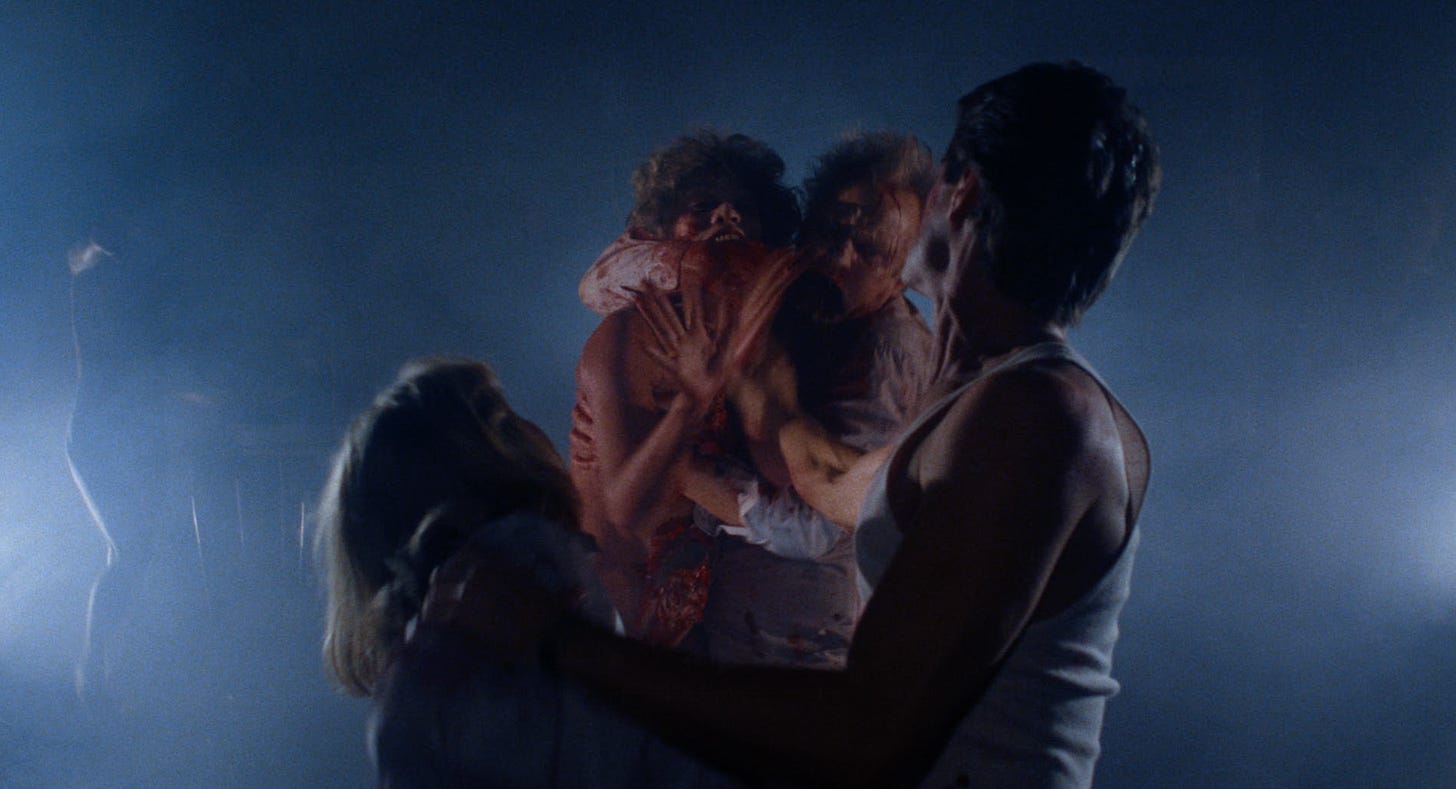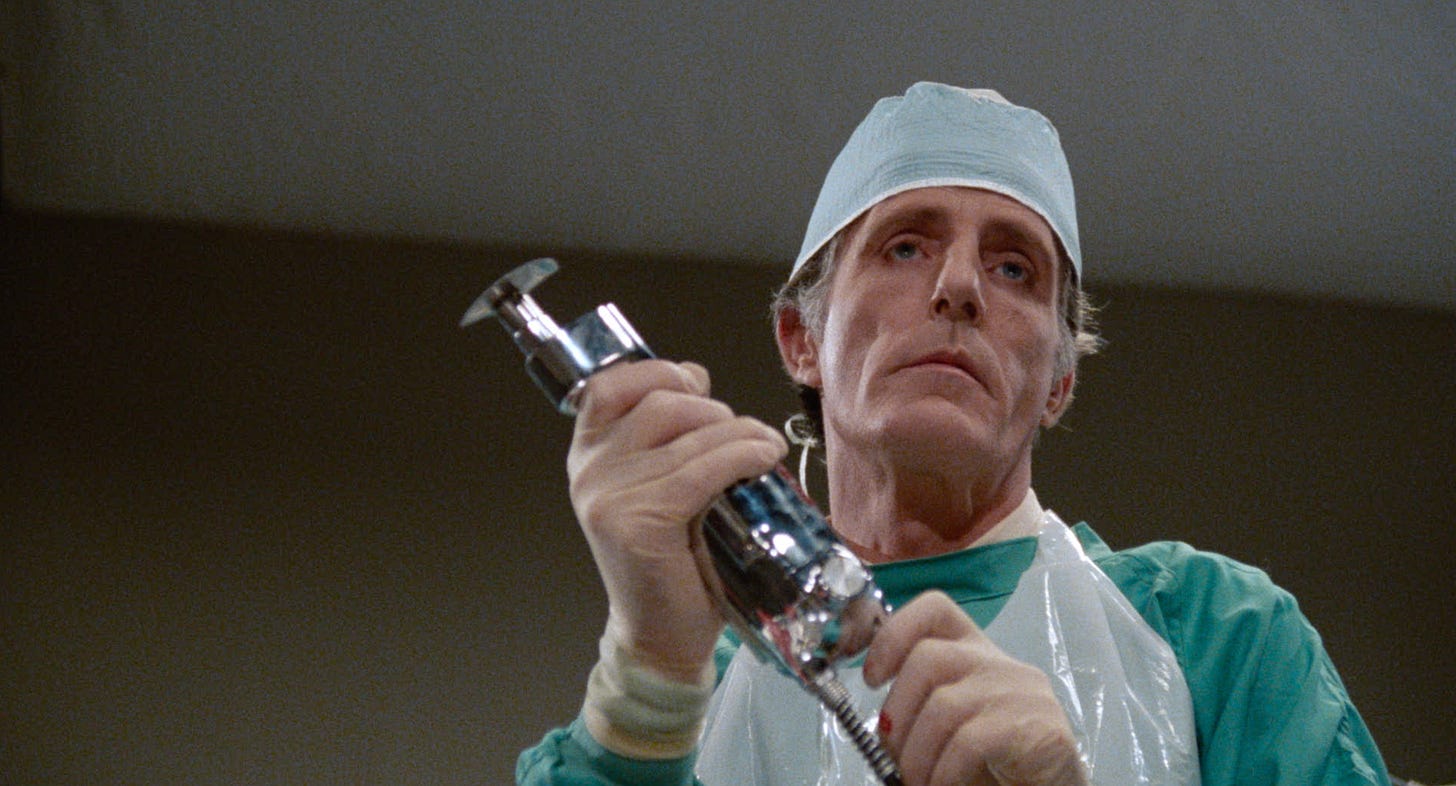Re-Animator 40th Anniversary 4K Review: Go, West!
Jeffrey Combs' breakthrough movie remains a masterpiece of the form
I've seen Re-Animator four times now: twice on home video in my early teens, once on film probably in my thirties, and now on the new 4K, at my own half-century mark. I think at this stage I can pretty easily say that, on its own terms, Re-Animator is a damn near perfect movie.
Why not absolutely perfect? Well, when actors playing corpses prior to reanimation are visibly breathing, that's an imperfection. A minor one, to be sure, and arguably one that inspires affection rather than derision. Indeed, playing dead is hard, and I probably could not do it myself as long as they do. (I have played dead in a movie, and failed to hold my breath for very long.) On the other hand, sometimes it's an imperfection that makes a thing beautiful, like – to use a reference as old as Re-Animator – the mole on Cindy Crawford's lip.
That aside, what a wonderfully put-together movie this is, in every way. Director Stuart Gordon had only done live theater before, but he took to cinema immediately; Jeffrey Combs was also mostly a stage actor, but his performance here is...well, maybe we can't say “star-making,” because he's arguably not a star, but he is such a distinctive character and genre actor, and every aspect of the persona he has made a living from was fully intact from the beginning. His Herbert West, the genius med student and re-animator of the angry dead, is maniacal, self-righteous, frightening, strangely sympathetic...and when viewed through modern eyes, probably on the spectrum. A Talking Heads poster appears to be, upon rewatch, foreshadowing of the film's ultimate severed-head villain, but Herbert West also has some echoes of David Byrne’s personality to him, which just seemed vaguely weird in the '80s but we now recognize as autism.
My wife loves Combs for his work in Star Trek: Deep Space Nine, but thanks to the fate of the cat and the notorious scene of sexual assault by severed head, I don't think I can ever show her Re-Animator. She might surprise me – the sense of humor in The Substance helped her stomach the gore – but I don't think we're going to put it to the test.
Though I feel I understood all the movie's appeal the first time I saw it, one thing I appreciate now is the sheer perfection of craft. It's a tight 86 minutes, with not a scene wasted, and the edits by Lee Percy perfectly timed to cut around visual effects limitations to sell the illusion, while Mac Ahlberg's cinematography uses shadows to hide what needs hiding, but showing us as much of the gore as he possibly can. Richard Band's main title theme, which undoubtedly influenced Danny Elfman, jauntily conveys the sense of a trip down a spiral staircase into a dark basement, or perhaps Hell itself. At other times, the score is so subtly mixed as to be barely audible on all but the most subconscious levels.
A subplot about the villainous Dr. Hill (David Gale) having a movie-magic-level power of hypnosis was wisely axed; remnants of it merely make him stare creepily instead. Barbara Crampton, who still looks great 40 years later, is lovely and game for the naturalistic and erotic nudity, while Bruce Abbott may look like a stiff, generic lead in the role of Dan (heck, he seems to be written as one too), but the actor genuinely acts in the part, and makes what could have been a bland hunk into a sympathetic hero.
I'm grateful major critics at the time got the joke, too. It's almost certainly on Pauline Kael's recommendation that my father agreed to let me see it, and even though he generally hated scary movies, he promptly showed it to his brother Mike afterwards. Mike had the most punk-rock aesthetic tastes of any of his brothers, and was won over by the scene where the cat jumps on the back of the lovers having sex.
As is pointed out in many of the extras, the movie may be forty years old, but it isn't that dated – characters don't use computers or phones, just medical tech still in use today, like defibrillation paddles, bonesaws, and a laser bone-cutter which seems to have been invented for the movie, but is relatively plausible. The most dated aspect is surely accidental – the first death in the movie is a scientist named Hans Gruber, a name that would later be used for Alan Rickman's villain in Die Hard.
The 4K restoration makes everything look like a pristine print adding depth to the shadows, and giving us the vaguest hint of Combs' pancake makeup to make him paler. It doesn't make any of the effects look worse – clever cutting still makes them impressive, and those living intestines at the end are grotesquely credible. As I mentioned earlier, the sound mix does impressive things with the score, and the bloodstains on the walls every time viscera is thrown at them are as vivid as ever. Stuart Gordon went on to have a great career as a director of horror and noir, but he set himself an impossible standard to equal with this masterpiece of splatter.
Ignite films could easily have pulled a Criterion here, adding a bare-bones 4K disc to its previously loaded Blu-ray that features three commentary tracks, a multi-chapter making-of documentary, a featurette on adapting the movie to the stage, interviews with Gordon/Band/Crampton, a guide to film adaptations of H.P. Lovecraft, extended and deleted scenes, and Jeffrey Combs reading the original Lovecraft short story.
But they didn't. All that is here, plus more extras on the 4K disc itself: a new, lengthy roundtable discussion with producer Brian Yuzna, Combs, and Crampton; a look at the film's legacy via interviews with filmmakers who were influenced by it; an interview with Gordon's wife Carolyn Purdy-Gordon; a retrospective look back at the stage musical; a short BTS look at the 4K restoration process; and a 1977 documentary about The Organic Theater Company of Chicago, featuring Stuart Gordon, Joe Mantegna, and a young, THIN Dennis Franz. It mostly focuses on the making of their comedy The Bleacher Bums, based on baseball superfans they had actually met. Gordon as a young man comes across as an easygoing prankster type, far from the intimidating-looking old man he was seen as in later years. If you have the Blu-ray already, there's enough here to make the 4K seem more worthwhile, plus all the existing commentaries also play on the 4K disc.
Horror can be easy. Comedy is harder, and horror-comedy the hardest of all, though when it's done well (see also An American Werewolf in London), it often sits atop the horror heap as a classic. Re-Animator deserves its place in the pantheon, and the fully loaded anniversary 4K disc is a worthy tribute to its greatness. For the $49.95 (and up, if you want more bells and whistles), it delivers.
Bring on the sequels.
Prefer not to subscribe via Substack? You can leave a tip through Buy Me a Coffee instead.
Images courtesy of Ignite.









